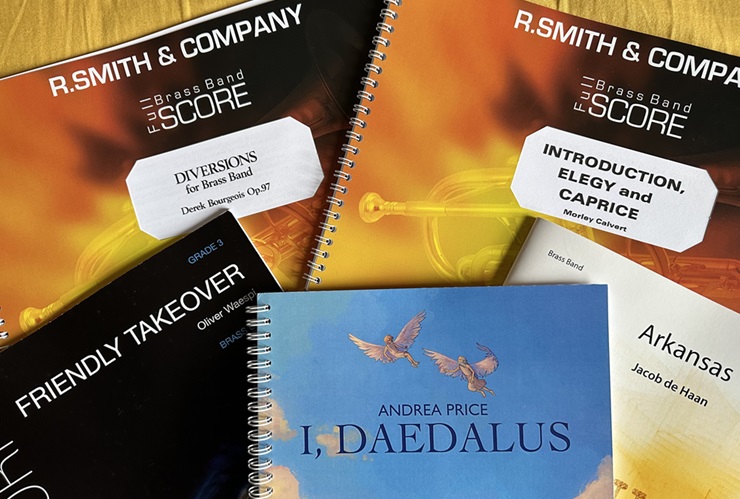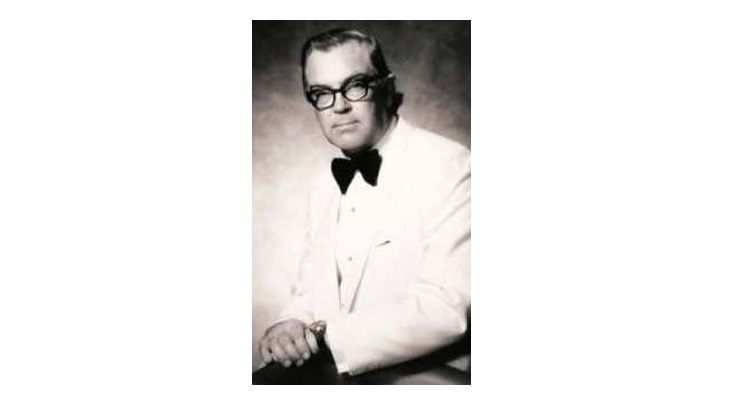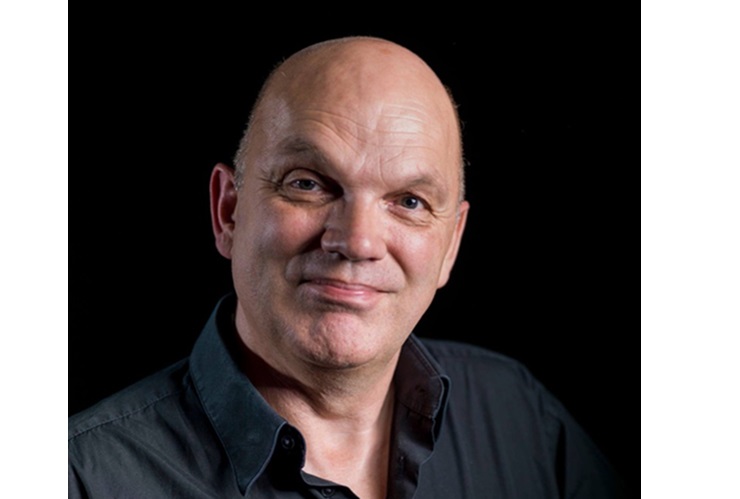
Championship Section:
Diversions for Brass Band (Derek Bourgeois)
In 1981 Derek Bourgeois’ appreciation of ‘an overwhelming attack of great ferocity’ made for a memorable test of the “skill, nerve and stamina” he required of soloists and ensemble alike to be able to win a major championship title.
‘Blitz’ (Op. 65) certainly created fevered debate: Howard Snell said that within 10 years it would be “as palatable” as ‘Spectrum’, whilst others were less charitable. The euphonium player Barrie Perrins later asked that for his next brass band opus, he could, “apply his undoubted talents to the subject of Peace”.

Whether or not Bourgeois (1941-2017) immediately took that to heart is unclear (he was more concerned about aspects of adjudication), but by the time of ‘Diversions’ (Op.97), his eclectic output had encompassed avenues as diverse as ‘Chamber of Horrors’ (Op. 66) to ‘Birthday Greetings to Harry Mortimer’ (Op.81). After it, he still continued on his own ever explorative way.
Response
However, ‘Diversions’ was certainly a response of a kind.
Written in the summer of 1985 following a commission by the Skellerup Woolston Band in New Zealand, like ‘Blitz’ (the title of which was only thought of when Bourgeois was writing its final section), it has no specific narrative theme.
Gone though is the aggression and forcefulness, the bombast and acidic wit.
Instead, it is a three-part exposition of musical structure and character; the first and third movements (both marked Allegro vivace) sharing tempo, but very different in style, the central section an expressive development in free rondo form.
Gone though is the aggression and forcefulness, the bombast and acidic wit. Although just as technically demanding, it is written with a different sense of outlook; lighter and more agile in its rhythmic pulse, its jauntiness melodic and precise, the lyricism less emotionally intense (the composer specifically asking for “firm control of vibrato, phrasing and rubato”).
Waspish sting
All the main soloists are tested to some degree – the most obvious the soprano, but with its more subtle use of dynamic changes, articulation and flow, there is a cohort rather than squadron feel to the airborne sounds of the ensemble writing.
The opening section trips along with a familiar dislocated feel, the dynamic contained, whilst the central movement has a melancholic timbre. And whilst the finale is certainly “a romp” – it is one not of increasing freneticism to a thumping demise. The sting in the tail here is waspish and pointed.
First Section:
Introduction, Elegy and Caprice (Morley Calvert)
It may seem slightly incongruous now that the test-piece for the first ever European Brass Band Championships in 1978 was commissioned not from a composer resident in the then ‘EEC’, but rather from one born and bred in Canada.
However, Morley Calvert (1928-1991) was a highly respected composer with strong anglophile musical appreciations – and especially with his influence within the Salvation Amry.

Academic rigour
With a fine academic background (a pioneering graduate of McGill University) he was the conductor of the Montreal Citadel Band for a decade and later the Weston Silver Band.
He wrote extensively for brass (from quintets to full band works), wind and voice, the academic rigour of his outlook heard in his works, including the informed scoring and structure of ‘Introduction, Elegy and Caprice’.
Calvert was also a great admirer of Eric Ball and the need to maintain clarity of thought and purpose in his writing – something clearly heard in this deceptively difficult score.
Calvert was also a great admirer of Eric Ball and the need to maintain clarity of thought and purpose in his writing – something clearly heard in this deceptively difficult score.
Space and breadth
Dedicated to his father “a more avid bandsman there never was”, it is an expertly balanced scholastic suite – the material for the first movement deriving from the opening figure in the horns underpinned by a timpani ostinato. The music has space and breadth even in the Allegro section that follows, the technical tests subtle yet substantive, its close delicate and precise.
The ’Elegy’ is a simple recitative – but one repeated four times with various contrapuntal and harmonic alterations and which leads to a close that is delicate and testing (especially for soprano).
A seamless ‘attacca’ link introduces a perky ‘Caprice’. Marked 144, it is music of zest and energy but not misplaced power – the sense of capriciousness essential to retain its character.
Second Section:
Friendly Takeover (Oliver Waespi)
Appearances can be deceptive. Swiss composer Oliver Waespi (1971) may well have the look of a learned academic (and he is of course), but there is perhaps no other composer for the brass band medium who so enjoys delving into a tasty bit of funk.
Waespi’s major works for brass band fall into two main categories – those inspired by the majesty of the natural world – think of ‘Audivi, Media Nocte’, ‘As if a voice were in them’ and ‘Traversada’, and his urban series, such as ‘Hypercube’ (which this work has little echoes) and ‘Other Lives’.

Absorbing hallmark
‘Friendly Takeover’ is very much in the latter camp, although it was originally written as a work for the Swiss Wind Band Convention in Montreux in 2016. Given Waespi’s skill as a composer it has easily been transcribed for the brass medium; the ominous close chord structures, pulsating rhythms and growing energy giving the piece its throbbing, absorbing hallmark.
The ’takeover’ is descriptive not narrative – the energy of the music growing incrementally towards a final overwhelming flourish from the opening fanfare statements marked crochet 104 to the closing piu vivace of around 160.
The ’takeover’ is descriptive not narrative – the energy of the music growing incrementally towards a final overwhelming flourish from the opening fanfare statements marked crochet=104 to the closing piu vivace of around 160.
Never passive
The writing is never passive – the percussion (and especially kit player) offering the heartbeat drive and pulsating groove that propels the music forward, whilst the low brass, even in the ‘Ballad’ section sees the solo lines shaped with a bluesy flow that has a hungry sense of forward momentum about it.
That turning point comes after an expressive euphonium solo that heralds the start of the flourish of funkiness and groove spirit – the drive growing in intensity to an end pinged by a cherry top-C on the soprano.
Third Section:
Arkansas (Jacob de Haan)
Dutch composer Jacob de Haan (1959) still has some way to go before he completes musical suites of all 50 states of the USA, but he is getting there.
'Arkansas’ follows in the footsteps of ‘Oregon, ‘Virginia’ and ‘Dakota’ – although his prolific output has seen him also stop off at ‘Everest’ and even ‘Cardigan Bay’ on his geographic musical expeditions.

Engaging
His compositions are melodically engaging - ‘Arkansas’ ostensibly based on a folk-song from ‘The Natural State’. He does not however touch on the music of its indigenous people and tribes of the region (they were all but wiped out by the early 1830s) – instead relying on a musical depiction more familiar to 1950 television westerns or the films of the likes of John Ford (written by another Dutchman in Richard Hageman).
He does not however touch on the music of its indigenous people and tribes of the region (they were all but wiped out by the early 1830s) – instead relying on a musical depiction more familiar to 1950 television westerns or the films of the likes of John Ford (written by another Dutchman in Richard Hageman).
The folk-song appears immediately to set the scene – one of refinement and sophistication set against the menacing undertones of the rather stereotypical ‘tribal’ music of the indigenous inhabitants of the plains; the resolute settlers overcoming the dangers to find their new home.
Delicate sunset
That is explored in the central section in the form a lyrical ballad, ornamented by filigree work on solo lines to suggest further sophistication amid the wilderness. It ends with a delicate sunset of muted cornets and tinkling chimes.
The finale brings the music forward with a pioneering sense of adventure and a curious flavouring of Ravel’s ‘Bolero’ somehow drawn into the mix.
It suggests a form of assimilation – the opening ominous ‘tribal’ inflections mastered once and for all as the work draws them together for its cinematic close.
Fourth Section:
I, Daedelus (Andrea Price)
Andrea Price has a growing catalogue of impressive compositions for the brass band medium – as was heard most recently with ‘And Earth Raised Up Her Head’ at the RNCM International Brass Band Festival.
‘I, Daedalus’ takes its inspiration from Greek mythology and the story of the inventor, craftsman and architect who created the famed Labyrinth maze for King Minos of Crete, which imprisoned the half man, half bull Minotaur (which inspired an opera by Sir Harrison Birtwistle).

Imprisoned
Daedalus was imprisoned as he also created a wooden cow for the Queen, which she used as some sort of marital aid to get impregnated by a bull – resulting in the birth of the Minotaur.
Understandably, the King didn’t want the story getting out so locked up Daedalus and his son, Icarus in a high tower. Desperate to escape they fashioned wings from feathers and beeswax to take flight, the result of which so the impetuous Icaraus fly too close to the sun, fall into the sea and being drowned (recalled in a brilliant painting by Dutch renaissance artist Peter Bruegel).
Clever narrative
The work is clever narrative led retelling of the tale – the five sections through composed to maintain its absorbing musical thread. The opening ‘Inventor in the Tower’ sets the post-imprisonment scene – bold, resolute and determined, the clever use of effects (there is plenty of informed ensemble and percussion writing) adding to their inventive escape plans.
The opening ‘Inventor in the Tower’ sets the post-imprisonment scene – bold, resolute and determined, the clever use of effects (there is plenty of informed ensemble and percussion writing) adding to their inventive escape plans.
Tenderness is revealed in the following ‘Father and Son’ interlude with solos for euphonium and cornet before the music takes flight – at first tentatively, then joyfully before Icarus’ recklessness and fateful fall to his death.
A Wilbyesque chord heralds a touching, if rather short ‘Lament’, before the music ends in optimistic, triumphant fashion as Daedalus seeks yet more knowledge to be used for good.
Iwan Fox













